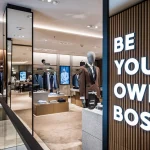 As the new head of Orsay, Sascha Bopp will continue to push ahead with the restructuring of the company and also use his expertise in multi- and omnichannel.
As the new head of Orsay, Sascha Bopp will continue to push ahead with the restructuring of the company and also use his expertise in multi- and omnichannel.
At Orsay, there is a change in leadership: CEO Matthias Klein is retiring from operational business at the end of this year. The 62-year-old was at the head of the DOB chain from Willstätt in Baden for ten years. Sascha Bopp, who is already on board and is currently familiarizing himself with his new area of responsibility, will be the new boss on January 1st.
Orsay GmbH designs feminine outfits. The Company offers city, party, casual, and denim collections for women. Orsay markets its products worldwide.
About Orsay by Orsay
ORSAY designs feminine outfits for every style and every personality with passion and has become a successful fashion brand for young women in 26 countries. This success could only have been achieved through our employees and their passion for fashion. ORSAY stands for young, fashionable, good value (affordable) outfits, in which women can express their individual femininity at all times. We understand this promise to be our greatest challenge and orientate our daily actions accordingly.
Our Vision and Recipe for Success
We want all our women customers to be able to afford to express their femininity individually through their outfits. We want to design outfits for modern, self-confident women who wish to dress according to their personal taste and style, always staying chic, feminine and trendy.
We are an international, vertically organised fashion company and manage the whole chain from design to production through to sales. With a well-coordinated product mix from Europe and Asia we offer our customers a broad and constantly up-dated selection of feminine outfits which perfectly balance style, quality and price. Behind this recipe for success are over 4,300 motivated and competent employees who are committed to meeting the challenge of our corporate vision.
Our Presence
We’re always near at hand with over 630 ORSAY shops in the following countries: Germany – Austria – Switzerland – Poland – Czech Republic – Hungary – Slovenia – Slovakia – Croatia – Ukraine – Russia – Latvia – Bosnia-Herzegovina – Serbia – Romania – Bulgaria – Montenegro – Malta – Moldova – Republic of Kosovo – Estonia – Albania – Armenia – Finland – Belarus – Georgia. Furthermore, in Germany, Austria, Poland, Slovakia, Czech Republic, Romania and Hungary we are available 24/24 via our ONLINE SHOP at orsay.com and in online application.
Facts and Numbers
- Since 1975
- Support center in Willstätt/Germany and support center logistics in Wrocław/Poland
- 1 purchasing office in Shanghai
- Over 640 shops in 26 countries
- Over 4,500 employees
- Average age of staff: 28
- Percentage of women: 96%
Our Efforts Towards Using More Sustainable Materials In 2019 already 40% of our cotton was sourced as more sustainable cotton. More sustainable cotton includes Better Cotton (BCI), recycled and organic cotton. We will be sourcing 100% more sustainable cotton by the end of 2022. Better Cotton (BCI): Orsay has been a proud member of the Better Cotton Initiative (BCI) since November 2017. BCI aims to make global cotton production better for the people who grow it, better for the environment it grows in and better for the sector’s future. Better Cotton is sourced via a system of Mass Balance (https://bettercotton.org/massbalance) and is not physically traceable to end products. Learn more about BCI Farmers: https://bettercotton.org/stories-from-the-field/. Recycled Cotton: Recycling cotton means converting existing cotton fabric into cotton fibers. These fibers are then used to make new products. The fabric used in the recycling process can come from production waste (pre-consumer) or from used textiles (post consumer). Through the use of recycled cotton in our products we aim to reduce waste and to use less virgin fiber. Organic Cotton: Organic cotton seeds are not genetically modified. No toxic and persistent pesticides or fertilizers are used when organic cotton is grown and less water is used for irrigation when compared with conventional cotton. Man-Made Cellulosics: We will source 50% of our viscose from more sustainable sources by the end of 2022. Lenzing™ Ecovero™: Manufactured only from certified and controlled wood sources and produced with significantly lower fossil energy use and water than generic viscose, LENZING™ ECOVERO™ branded viscose fibers are certified with the internationally recognized EU Ecolabel. This label of environmental excellence is only awarded to products and services, which have a significantly lower environmental impact throughout their lifecycle: from raw material extraction, to production, distribution and disposal. Consumers can be assured that their fashion choices are sensitive to environmental concerns. Our Commitment to Forests We partner with the NGO Canopy and support approaches and systems that protect the world’s remaining ancient and endangered forests and endangered species habitat. We have committed to eliminating use of ancient and endangered forests materials in our man-made cellulosic fabrics by 2020, (including rayon, viscose, lyocell, modal and other) and paper and packaging by 2022. We are working with Canopy to influence these supply chains and support the development of next generations solutions. You can find further information in our Commitment to Protect Forests Through our Paper, Packaging and Fabrics Choices policy. Polyester: By the end of 2022, 30% of the polyester used in our collections will be recycled polyester. Recycled polyester has been manufactured from materials recovered from the waste stream. The waste used in the recycling process can come from production waste (pre-consumer) or from products which have already been used (post-consumer). With the use of recycled polyester we aim to reduce our reliance on non-renewable crude oil (used to produce most virgin polyester) and to contribute to a reduction of waste. Environment: We are working together with our supply chain partners, industry initiatives and other critical stakeholders on improving our environmental practices We measured our environmental impact in 2019 with an EP&L and are today working on the reduction of our impacts. Orsay is part of Fashion Cube, an ecosystem of six fashion brands, working together to share knowledge and accelerate their responsible business practices. Together with our Fashion Cube partners, we joined the Fashion Pact and are thus committed to protect our climate, biodiversity and the oceans with clear time bound targets. To promote more sustainable chemistry and transparency, we are working with The Bhive. We are committed to improve wastewater management in textile production through our engagement in the Wastewater Initiative of the Partnership for Sustainable Textiles. Our Commitment to Forests: We partner with the NGO Canopy and support approaches and systems that protect the world’s remaining ancient and endangered forests and endangered species habitat. We have committed to eliminating use of ancient and endangered forests materials in our man-made cellulosic fabrics by 2020, (including rayon, viscose, lyocell, modal and other) and paper and packaging by 2022. We are working with Canopy to influence these supply chains and support the development of next generations solutions. Social Justice: Our goal is to continuously improve social standards and working conditions in our supply chain in cooperation with our suppliers and multi-stakeholder initiatives. This is why we monitor the working conditions in 100% of our suppliers' sewing factories through audits and are a member of the Initiative for Compliance and Sustainability (ICS). We work continuously with the factories through training and improvement programmes. As a signatory to the Accord on Fire and Building Safety of 2018, we are committed to safe working conditions in the ready-made clothing and garment industry in Bangladesh. As part of our membership in the Partnership for Sustainable Textiles, we regularly report on the achievement of selected targets. Together with our Fashion Cube* partners we have also responded to the call of the International Labour Organization (ILO) and signed the Call to Action COVID-19: Action in the Global Garment Industry.







